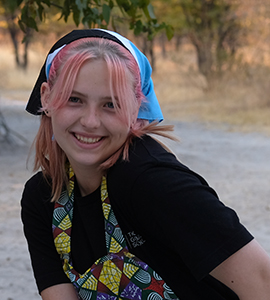
Art is such a big part of Oaxaca’s culture and its diversity is what makes it so unique. We had the chance to talk to artists who make art for a living, and it has been in their family for 5 generations. We also had the chance to talk to newer artists who may not depend on it for an income. It has been a very interesting experience to take in all the different perspectives of these artists, and learn about how they all coexist in the same place.
-Class of 2024 Student Keetah B..
Driving Question: How might we convey the intersection of local arts and economy through documentary filmmaking?
What were your goals for this module? How did you achieve them?
During the AyAyAyAyAy module, my goals were to improve my filmography skills while gaining an in-depth understanding of art and economy here in Oaxaca.
Through this module, we were filming and editing for hours at a time, so I improved my filmography skills through constant practice and analyzing what I did wrong and how I could improve it. We also got feedback from local videographers, which was very useful when using Premiere Pro for the first time.
During both the weXplore and back at the main residence, the experiential learning really helped me feel like I understood Oaxacan art. We even got to take part in making the art and talk to the artists. I now have a greater understanding of the relationship between art and economy, art and politics, and art and culture. I feel that I have also learned about how vital artisanship is here and the perspective more modern artists have of artisans.
What new things did you learn about yourself?
I learned more about my filming style and what I can improve on when filming. I also learned that I’m a perfectionist, especially when it comes to editing.
I learned that my perspectives of what art is and the motivations people have for art don’t always align. I also learned how people’s perspectives of art itself might change depending on why they do art.